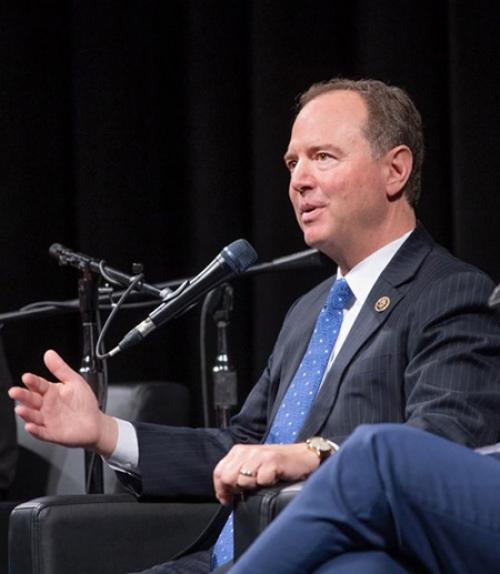Around the globe and from within, the nation now faces the most vigorous challenge to the idea of liberal democracy since World War II, U.S. Rep. Adam Schiff said during an Oct. 10 visit to Cornell.
“There is a very new and pernicious ideological struggle going on now between democracy and representative government, and dictatorship and autocracy,” said Schiff, a Democrat from California. “This I think is the seminal ideological challenge of our time.”
Chairman of the House Intelligence Committee, Schiff spoke at the Schwartz Center for the Performing Arts’ Kiplinger Theater as part of the “Inside Congress” series sponsored by Cornell’s Institute of Politics and Global Affairs.
The event was billed as an opportunity to learn about the role of the Intelligence Committee and congressional oversight of national security, but current events took center stage, with the House’s impeachment inquiry against President Donald Trump – led by Schiff – dominating the discussion.
“Anything going on in your life recently?” joked Steve Israel, a former congressman and director of the sponsoring institute, noting that he’d been uncertain until the night before if Schiff would be able to keep his appointment in Ithaca.
Schiff said he wasn’t an early proponent of pursuing impeachment, fearing that a failed process might embolden Trump and future presidents about what conduct would be tolerated.
But Trump asking Ukraine to investigate Democratic presidential candidate Joe Biden and his family, apparently while withholding military aid approved by Congress, Schiff said, constituted “a bridge too far.”
He said when the founders drafted an impeachment clause, they were deeply concerned about the potential for foreign interference in American politics or a foreign hold on an American leader.
Schiff said he came to support an impeachment inquiry because “the risk that the president feels that he can do anything – no matter how improper, illegal, egregious – and there is no accountability, is the principal danger right now.”
Legally, Schiff said in response to an audience question, it doesn’t matter whether the Ukraine talks involved a quid pro quo, only that Trump solicited a foreign power to interfere in the 2020 election.
Douglas Kriner, the Clinton Rossiter Professor in American Institutions in the College of Arts and Sciences and faculty director of the Institute of Politics and Global Affairs, asked about implications for the separation of powers of the Trump administration’s repeated resistance to congressional oversight.
Schiff said many presidents have griped about congressional oversight but complied with their constitutional responsibility to a co-equal branch of government. The “absolute nature” of the Trump administration’s stonewalling is unprecedented, he said, and would have lasting consequences for the balance of power if it succeeds in rendering Congress powerless.
The courts have sided with Congress in important matters concerning its oversight powers, including regarding the Watergate tapes, Schiff said. But he said there’s a fundamental difference in today’s world compared to the early 1970s: The presence of media outlets offering “an alternate information ecosystem in which the president’s supporters can live.”
Because of that, Schiff said, the nation is now more polarized. Fewer Republicans are willing to stand up to the president or to put the interests of democratic institutions ahead of party interests.
Schiff shared concerns about the administration’s inaction regarding potential Russian interference in the 2020 election; about falling morale in the intelligence community; and about the chilling effect that could result from Trump’s threats to out the whistleblower whose complaint sparked the impeachment inquiry.
The latter issue should worry members of both parties, he said, because “next time the whistleblower may be blowing the whistle on a Democratic president.”
Schiff concluded with a call to action, urging students not to let an “ugly and divisive period” discourage them from engaging in politics or public service.
“This is a time when the country needs each and every American, where I think the fate of our democracy is at stake,” he said. “Don’t be discouraged, be involved.”
The nonpartisan Institute for Politics and Global Affairs’ mission is to raise political discourse and deepen understanding of domestic and international affairs.
On Oct. 17 in New York City, the institute will host an “Inside the White House” discussion with Reince Priebus, former White House chief of staff for Trump and former chairman of the Republican National Committee.
Additional upcoming events this year will feature Charlie Cook, editor and publisher of the Cook Political Report; Republican congressman Peter King; and Chris Matthews, the host of “Hardball with Chris Matthews” on MSNBC.





